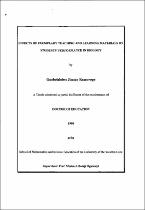| dc.description.abstract | This study sought to determine the effects of exemplary teaching and learning materials on students' participation and achievement in biology in Botswana science classrooms. In particular, it was concerned with examining the effects of student-teacher-material interactions on the students' participation and achievement in biology. The method adopted for this study was an eclectic approach in which both quantitative and qualitative approaches were used to complement each other. In order to understand the social processes and meaning that the participants in this study attach to phenomena, a qualitative approach based on social interactionism was adopted. The role played by the researcher in this study was that of a participant-as- observer. To explore life in Botswana biology classrooms and to unravel the complex social aspects of teaching and learning, a holistic ethnography (used alongside a variety of micro-ethnographies) were adopted for the study. Ten experienced biology teachers were involved in identifying the topic that could be developed for exemplary practice as well as in validating the materials that were produced. They also responded to the exploratory questionnaire on the traits of an exemplary biology teacher, which formed the basis for the development of the exemplary package. An induction workshop was conducted for the exemplary teachers to help them explore and reflect on their practice with a view to create in them an appreciation for the exemplary approach to teaching and learning. The curriculum package consisted of the students' workbook, scheme of work, lesson plans and an achievement test. A sample of seven schools was used in the study. Two schools were used for each of the co-operative, competitive and individualistic groups and the last school was the used as the true control group. To minimize the effects of contamination, the treatment groups were chosen from different areas of the country. A total of seven teachers md 446 students were involved in the study. A quasi-experimental research design modified from the Solomon-three- control group design was used. Also, qualitative methods were used to capture the data that were not easily amenable to quantification. The findings of this study suggest differences in the interaction behaviours of conventional and exemplary teachers. The conventional teachers tend to out- talk their students while the exemplary students tend to out-talk their teachers. Also, the verbal and non-verbal interactions of the conventional teachers exceed those of their students. On the other hand, the students' verbal and non- verbal interactions exceed those of the teachers in the exemplary classes. Teachers in both the exemplary and conventional classes ask predominately factual questions compared to the exemplary teachers who ask more leading and probing questions. Students in two treatment groups (co-operative and competitive experimental) performed significantly better than those in the true control group. However, performance in the two treatment groups with respect to achievement in the Biology Achievement Test is quite identical. No significant difference is observed between the performance of the students in the third treatment group (individualistic) and those in the true control group. The use of exemplary teaching and learning materials seemed to have enhanced the achievement of the girls, low ability and average ability students in all the assessed variables while the conventional teaching strategies seemed to have enhanced only the achievement of the average ability students. Students perceive an exemplary teacher as the one who; (i) encourages student participation irrespective of their gender and academic ability, (ii) gives homework and marks it, (iii) ensures that students are on task. Students in exemplary classes describe their experiences in practical activities as enjoyable, providing opportunities to learn new things and providing specific episodes during biology lessons. When the learning task is unfamiliar, students seem to ask more procedural questions in their small groups, while they tend to ask more thought-provoking questions if the learning task is familiar. In group discussions, students seem to use a variety of strategies to improve the chances that the group accepts their ideas. These include among others, discrediting the source of the counter-argument, sarcasm, substantiating their arguments, lobbying for support and introducing new evidence. | en_US |

